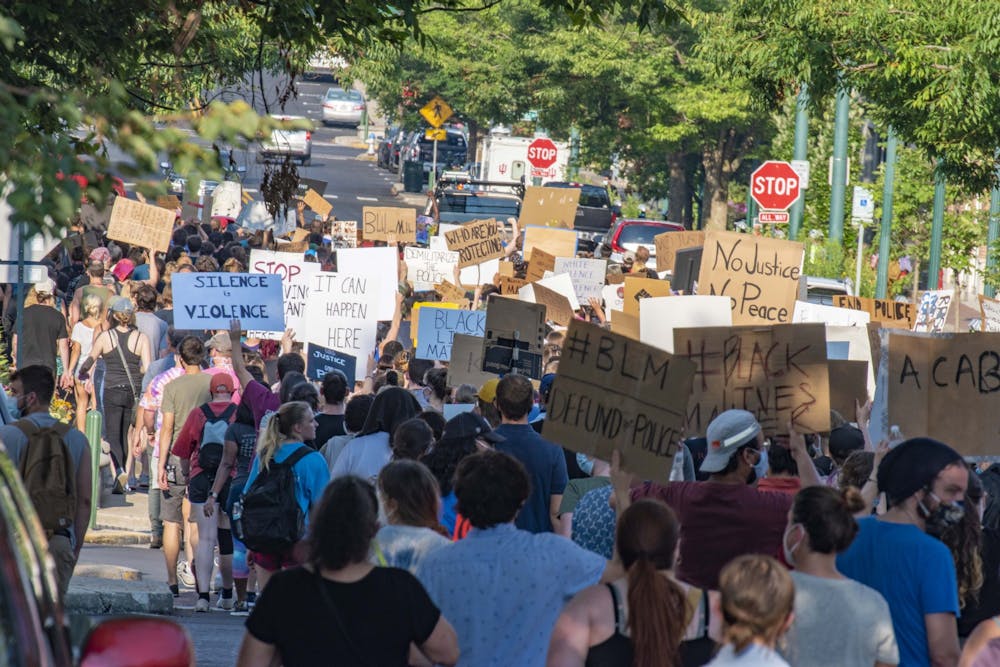IU’s Black Student Union and National Association for the Advancement of Colored People’s leaders critique the state of civil rights on campus, using Martin Luther King Jr. Day to reflect on past instances of racism on campus and consider the present challenges of funding with IU administration.
While leaders of IU’s BSU and NAACP celebrate the work of Martin Luther King Jr., they are also working to generate funding, communicate with IUPD on racial inequality within policing and avoid violence from some Trump supporters.
Junior Ramatou Soumare, co-president of NAACP at IU, said she’s apprehensive of potential riots on Jan. 20, especially after the events at the U.S. Capitol building.
“It's hard to see the work that MLK has done and the things that he stood for being destroyed,” she said.
[Related: IU political panel discusses impeachment, political climate after Capitol insurrection]
Soumare said she is also concerned about the COVID-19 vaccination distribution effort due to the influence of racial injustice in medicine.
The actions of some supporters of outgoing President Donald Trump have been a significant source of anxiety for Soumare, given the ominous threats of attacks on Inauguration Day.
“Since the beginning of this administration, we've always been afraid of backlash from those who support the administration,” she said. “And so with the inauguration coming up on the 20th it's definitely a very scary time.”
The issues the Black community faces are nothing new, Soumare said. She said the insurrection, police brutality and inequalities in school funding reflect similar issues Martin Luther King Jr. experienced.
“History is constantly repeating itself,” Soumare said.
However, the leadership of NAACP at IU is remaining hopeful.
“I'm always going to be scared, but I kind of have to find solace in my culture,” Soumare said. “I have to find comfort in my blackness.”
Junior Mariame Sow, the other co-president of NAACP at IU, said the fight for Black rights has been unfolding for decades and encouraged endurance for communities of color through this time of political and social division.
“All things must fall apart before they're built back up again,” she said.
The student leaders said they are inspired by Martin Luther King Jr.’s legacy to keep working towards a better future for marginalized communities. Soumare is motivated by King’s deep commitment to diversity, especially with the inclusion of Black women active in planning the actions of the movement.
“There are a lot of stories out there about Black women in the movement who were shut out completely,” Soumare said. “But he was one of those people who accepted the work of women of color and encouraged them.”
Obstacles still exist for minority communities at IU, such as a lack of both funding and attention from administration, Sow said.
“It's no secret that funding is pretty hard to get your hands on for any org, but let alone a minority organization on campus,” Sow said.
IU’s NAACP chapter developed a list of items to bring to the attention of the IU Board of Trustees based on a survey launched at the beginning of this school year, Sow said. The organization was particularly interested in addressing issues such as the renaming of Biology Building and anything associated with David Starr Jordan’s name, the need for racial bias training for students, faculty and staff at IU and student safety on campus.
“I would say the most pressing issue is the safety of the learning environment in general for students of color on campus,” she said.
Last semester during Welcome Week a group of unknown individuals interrupted IU’s NAACP Zoom call with racial slurs and verbal attacks. Sow said the organization used the incident to show the strength of their organization.
“Even though we heard these terrible things being said to us, we didn't let it affect our work,” she said. “If anything it made it stronger, and it had more people join our chapter because they’ve seen a stand in solidarity.”
Soumare said the NAACP at IU has also met with the IU Police Department to discuss issues with unfair policing of Black communities and communities of color.
“There have been a lot of stories of people who have faced discrimination, whether that's the Bloomington police or that's IUPD,” she said.
Genuine support and attendance at protests and marches is one of the best ways for individuals who are not people of color to be advocates, Soumare said.
Junior Ariyonna Cousins, Vice President of BSU at IU, said she has felt little support from faculty and professors. Cousins said seeing racist comments from still-practicing professors is particularly disheartening.
For white individuals, Cousins said she encourages education and consistent, honest support.
“Definitely educate yourself before reaching out or wanting to come out for a cause that you haven't properly understood,” she said.
Even with the uncertainty of Biden’s incoming administration, she remains focused on the mission started by Martin Luther King Jr.
“I think that we have work to do. I think we'll always have work to do,” Cousins said.



